Doctors say symptom cluster differs by patient, so care must be customized
By LISA EISENHAUER
Given all the interference — sleep-inhibiting blue light streaming from phones, computers and TVs, stress and schedule changes from the COVID-19 pandemic, and the yearly shift into and then out of daylight saving time, to name a few sources —
it shouldn't be a surprise that most Americans aren't getting enough ZZZs.
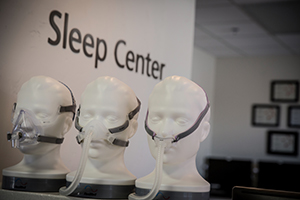
A variety of masks used with continuous positive air pressure machines to treat sleep apnea on display at the sleep center at Mercy Hospital Ardmore in Oklahoma.
To help, places like the Sleep Disorders Center at HSHS Sacred Heart Hospital in Eau Claire, Wisconsin, are constantly evolving and expanding their care. In its 21 years in operation the center has moved out of the hospital into its own clinic with hotel-like
rooms for overnight sleep testing. More recently, its care providers have begun using a small device to test for sleep apnea that patients use from the comfort of their own beds.
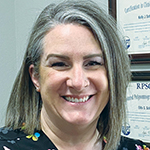
Schmidt
"I say sleep is just as important as the exercise that you get, the food that you eat, the water you drink and the air you breathe," says Kelly Schmidt, who has been the sleep center's facilitator since its opening. "It's just as important as those things,
but we always put it on the back burner."
The HSHS Sacred Heart Hospital Sleep Disorders Center is one of eight within the Hospital Sisters Health System, which has 15 hospitals in Wisconsin and Illinois. The centers are among the more than 2,500 nationwide, including many at Catholic health
systems, that are accredited by the American Academy of Sleep Medicine. The academy was founded in 1975 and grew from research started about 10 years earlier linking sleep and
health, according to the Journal of Clinical Sleep Medicine.
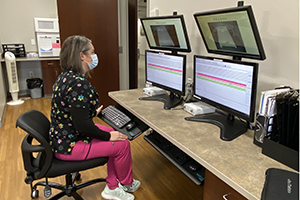
Kelly Schmidt, facilitator of the Sleep Disorders Center at HSHS Sacred Heart in Eau Claire, Wisconsin, checks on the monitors and computers that polysomnographers use to record sleep-related indicators of patients who are undergoing overnight studies.
Chronic sleep issues
Even with decades of research showing the importance of a good night's sleep, the wide expansion of treatment and sleep care coverage from Medicaid and most other insurers, studies show that many Americans don't
get adequate overnight rest. The Centers for Disease Control and Prevention estimates that 70 million Americans suffer from chronic sleep issues.
A systemic review of research papers published in Feb. 1, 2021, in the Journal of Clinical Sleep Medicine found sleep problems to be
particularly pronounced during the COVID-19 pandemic. The review concluded that about 32% of people worldwide were having sleep problems with higher incidences among patients with COVID, 75%, and health care workers, 36%.
Schmidt and other sleep care providers say they are unaware of any specific tracking that's being done that links the sleep disorders they currently are seeing at their centers to the pandemic. However, they don't doubt that upended work, school and
social schedules as well as stress and depression related to the health care crisis are keeping some people up at night.
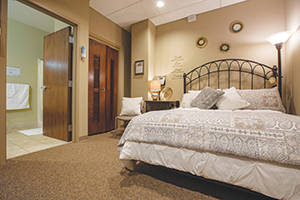
Mercy Sleep Center – Quailbrook in Oklahoma City has home-like decor to encourage sleep-deficient patients to be at ease during a night when their sleep is monitored. Mercy's hospitals in Oklahoma, Missouri, Kansas and Arkansas are affiliated
with about 20 sleep centers.
Many disorders, many treatments
Before training as a polysomnographer and helping open the sleep center, Schmidt was a respiratory therapist. In 2015 she returned to school and added sleep health educator to her role. She works
with a sleep doctor to provide behavioral therapy to people with insomnia.
She points out that there are 84 recognized sleep disorders. Those she sees most frequently at HSHS Sacred Heart Hospital include sleep apnea, insomnia and narcolepsy.
Treatments vary along with the disorders. They span an ever-expanding selection of medication, sleep hygiene education, surgery to address nasal blockages and the use of devices, such as continuous positive airway pressure machines (commonly known
as CPAPs) that help prevent the sleep disruptions that occur when people with apnea repeatedly stop and start breathing during sleep.
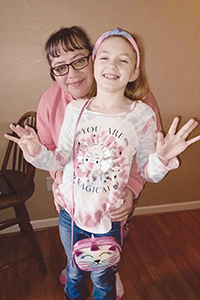
Lisa Carlsen, seen here with her granddaughter Rosie Mansfield, was diagnosed with sleep apnea after electronic in-home sleep monitoring.
Polysomnography, a comprehensive in-lab study, is still considered the gold standard for sleep disorder testing. Technicians attach sensors to a patient's head, chest and legs to track brain waves, eye movements, heart rate and breathing patterns
and limb movements, among other things.
Testing at home
Many patients don't want to spend a night at a clinic hooked up to machines by electrodes, and they will instead opt for at-home testing.
Lisa Carlsen of Chippewa Falls, Wisconsin, is among them. Her doctors long suspected she had sleep apnea but Carlsen says she delayed getting tested because of her busy life, which includes caring for a school-age granddaughter, and her propensity
to procrastinate.
"I wouldn't be able to fall asleep for the longest time," she says. "When I would finally fall asleep, I literally woke up every hour to hour and a half."
When she did the at-home test through HSHS Sacred Heart Hospital, she was surprised by its simplicity.
The device she used has a small monitor that straps around the wrist, a quarter-sized sensor that rests on the chest and a cap-like sensor that fits over the tip of one finger. It records breathing and heart rate, airflow, blood oxygen level and other
measures. The recordings are downloaded at the sleep center and scored by a technician. A sleep doctor uses the findings for diagnosis.
Carlsen got her sleep apnea diagnosis in November. She started using a CPAP in February. "The very first time I used it I slept 7½ hours straight," she says. "I definitely needed to do this and should have done it before."
Links to other illnesses
Sleep apnea isn't Carlsen's only health condition. At 58, she's disabled because of hip and back issues and she has diabetes. Sleep care specialists say many sleep disorders have connections to other
health conditions, such as respiratory and cardiac ailments, obesity, and diabetes, which can be the cause or result of sleep issues.
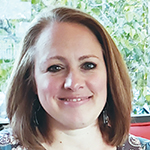
Brunson
Connie Brunson is a physician's assistant at Our Lady of the Lake Sleep Center in Baton Rouge, Louisiana. The center is part of Our Lady of the Lake Regional Medical Center, which is within the Franciscan Missionaries of Our Lady Health System.
Brunson says when she goes over the potential symptoms of a disorder such as sleep apnea — including slow weight gain, memory/focus issues, mood swings and high blood pressure — with patients the response sometimes is "I have all these
things. That's me."
Many of those patients may reluctantly agree to use a CPAP. The device, she says, takes a bit of getting used to, especially since patients must sleep with a mask strapped over the nose all night. "For people who actually do what they need to do and
use it appropriately, once they get over the hard part, which is adjusting to the equipment, they don't want to sleep without it," Brunson says.
Not all sleep disorders are rooted in a physical malady. Stress, depression and poor sleep habits also are common culprits. For hygiene issues, Brunson and the sleep doctor she works with can help patients come up with schedules and suggest practices,
such as turning off the electronic distractions well before bedtime, to get sleep patterns on track.
A sleep psychologist joined Brunson's team last year to treat patients with mental health issues that are keeping them awake. That practitioner offers behavioral counseling and coaching on coping skills.
Playing detective
Dr. Dianne Gasbarra is a pulmonologist who is medical director for Mercy Sleep Center – Quailbrook in Oklahoma City, one of 20 sleep centers across the system that also has hospitals in Missouri, Kansas
and Arkansas. She says practicing sleep medicine sometimes "is like being a detective" because of the many sources and manifestations of sleep disorders.
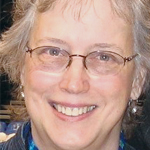
Gasbarra
Gasbarra has treated many patients with atypical histories. One was a college student who nodded off at the wheel while heading home on break and crashed his car. The student's parents feared he was using drugs. Gasbarra found the cause of his sleepiness
was narcolepsy, or daytime drowsiness, and his condition was easily addressed with medication. Another young man came to her before seeing a psychiatrist for problems with sleeping and focusing. In that case, she found that he had undiagnosed
seizures and needed medication.
Gasbarra also works with some patients whose sleep disorders likely would resolve with lifestyle changes, she says, such as the teenagers she has urged to disconnect in the hours before bedtime from the screens they have in constant use for texting,
gaming and monitoring social media. "That is not a discussion that a teenager wants to hear," Gasbarra says. "I see these kids once and then they don't come back."
Time for consistency
One change that sleep care practitioners seem to agree would help all Americans sleep more soundly year round is to stop setting the time forward an hour in the spring and back an hour in the fall.
The American Association of Sleep Medicine lauded the Senate for voting in March to get rid of the seasonal clock adjustment. However, the group differed with the Senate on which time to make permanent. The Senate measure gave the nod to daylight saving time; the association prefers standard time.
Gasbarra agrees with lawmakers and others who say the time change can be hard on people, at least initially. She notes that research has shown there is an upswing in heart attacks and motor vehicle accidents, especially just after the hour loss from the "leap forward" in the spring.
Even so, she doesn't see the time change as a major sleep disruptor for Americans. A much bigger concern in her view is poor sleep habits. "Go to bed, get your amount of sleep and you'll function better during the day," she urges.